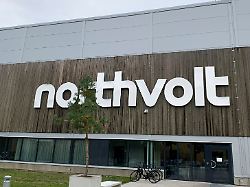Coup for Schleswig-Holstein
Northvolt builds giga factory on the North Sea
05/12/2023 12:34 p.m
For a long time, people in Schleswig-Holstein trembled as to whether the project would still fail. But it is now clear: Northvolt will build a battery factory near Heide – if there are appropriate subsidies. In the north, that’s considered a coup.
Swedish battery manufacturer Northvolt has decided to invest billions in building a battery cell factory in Heide, Schleswig-Holstein, provided the EU approves subsidies from Germany. Northvolt and the federal government announced this together. Both the federal government and the state government of Schleswig-Holstein would support the project. However, the subsidies still have to be approved by the EU Commission.
The Federal Ministry of Economics also stated that the amount of the subsidy had not yet been finally decided. “Northvolt has made it clear that the investment in Heide is subject to a grant approved by the European Commission in compliance with competition law.” Previously, doubts had arisen as to whether Northvolt could postpone the already planned construction in Heide in favor of a location in North America. According to initial plans, one million batteries are to be produced there every year with around 3,000 employees.
For Schleswig-Holstein and also the region around Heide in the Dithmarschen district on the North Sea, it is a big coup that a well-known manufacturer has decided to make such a large investment in a future technology in the north. “The region has the cleanest energy network in Germany,” said Northvolt in the past. Schleswig-Holstein would like to play a leading role in the energy transition and attract companies with green electricity, which is mainly produced from wind power. The location of the Swedes’ Gigafactory plays into these plans – and clearly demonstrates a competitive advantage over other regions.
Is the north losing out to the south?
For example, the expansion of wind power in southern Germany is lagging behind considerably. Detlef Fischer, Managing Director of the Association of Bavarian Energy and Water Industries (VBEW), told the “Focus” last year: “Basically, we’ve been left behind for a long time. At the time of Franz Josef Strauss, it was inconceivable that Bavaria wouldn’t supply itself with electricity Our energy supply system is increasingly sewn to the brim. We are already hearing that this is why industrial companies are no longer settling in Bavaria.”
Meanwhile, Schleswig-Holstein is calling for greater benefit from self-produced, cheap green electricity. Electricity prices are sometimes higher in the north than in the south, which is increasingly met with displeasure. One reason for the problems is the sluggish development of high-capacity power lines in the more populous countries to the south and west, where a larger proportion of the previous industrial plants are located. The south and south-west German federal states fear being left behind by price zones, for example.
“A weakening of the economically strong countries of the south and west cannot be in the interest of the federal government or the north German states,” says a statement adopted by the prime ministers of Bavaria, Baden-Württemberg, Rhineland-Palatinate, Saarland, Hesse and North Rhine-Westphalia. Above all, they see the danger of being left behind in the development of the future hydrogen supply or by a cheaper electricity price in the north. “The separation of the price zones would result in further serious negative effects,” warn the six country heads. However, green hydrogen is likely to be produced mainly in the north because of the cheap wind power.
